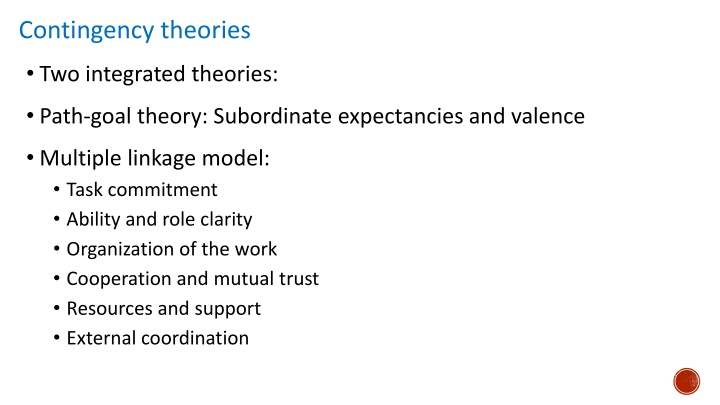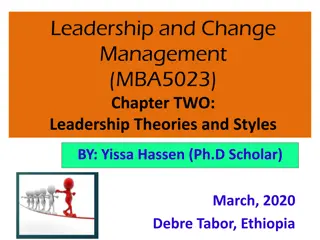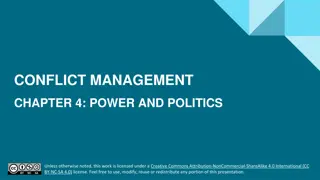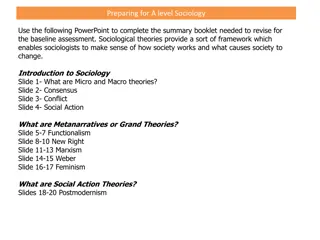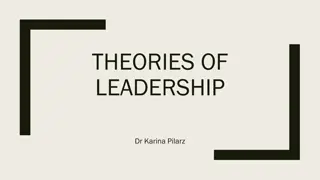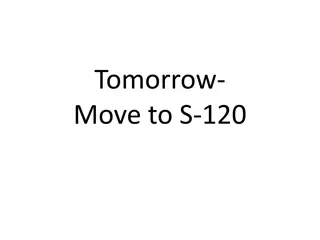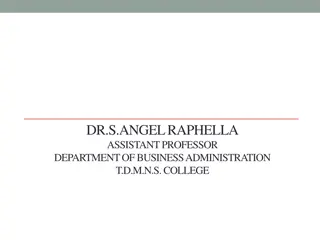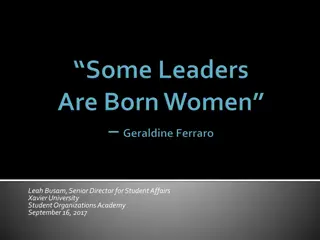Leadership Theories and Power Dynamics in Organizations
Explore contingency theories, dyadic theories, power and influence concepts, and leadership lessons from "12 Angry Men". Dive into the significance of leader-member exchange (LMX), political skills, and the interplay between power, politics, and organizational efficiency.
Download Presentation

Please find below an Image/Link to download the presentation.
The content on the website is provided AS IS for your information and personal use only. It may not be sold, licensed, or shared on other websites without obtaining consent from the author.If you encounter any issues during the download, it is possible that the publisher has removed the file from their server.
You are allowed to download the files provided on this website for personal or commercial use, subject to the condition that they are used lawfully. All files are the property of their respective owners.
The content on the website is provided AS IS for your information and personal use only. It may not be sold, licensed, or shared on other websites without obtaining consent from the author.
E N D
Presentation Transcript
Contingency theories Two integrated theories: Path-goal theory: Subordinate expectancies and valence Multiple linkage model: Task commitment Ability and role clarity Organization of the work Cooperation and mutual trust Resources and support External coordination
Dyadic Theories What is leader-member exchange (LMX)? How do leaders and followers develop LMX (two approaches)? What are the consequences of having high LMX? Can leaders develop high-quality LMX with every subordinate? Why? If not, what are the consequences of developing different levels of LMX with subordinates? Relative LMX LMX differentiation Reflections based on the case study - What a Star, What a Jerk in terms of effective leadership (root of the problem & how to correct deficiencies)
Learning objectives Understand the concept of politics What is politics? What is political skill? Understand the concept of power What is power? What are the five types of power? What are the consequences of having and using power? Understand the six principles of influence What are they? How can you use them to influence others more effectively? Leadership lessons from 12 Angry Men
Power & Politics Politics is the process of gaining and using power. Statements Agree% 93 89 76 Workplace politics is common in most organizations Successful executives must be good politics The higher you go in organizations, the more political the climate becomes You have to be political to get ahead in organizations Politics in organizations are detrimental to efficiency Politics help organizations function effectively 69 55 42 From Gandz & Murray (1980)
Power & Politics Political skills: the ability to effectively understand others at work, and to use such knowledge to influence others to act in ways that enhance one s personal and/or organizational objectives Political skills (in combination with performance) help you to gain influences at work Influence From Treadway et al., (2013)
Power What is power? The absolute capacity of an individual agent to influence the behavior or attitudes of one or more designated target persons at a given point of time. Five main types of power Legitimate power Reward power Coercive power Referent power Expert power Position Power Personal Power
Power: Position Power Legitimate power - stems from authority over work activities Implicit mutual understanding that members should comply with the rules and directions from leaders for membership in return To gain and use legitimate power: Take a managerial job Exercise your legitimate power: define the job scope and ask people to do things within their job scope BUT also back up your legitimate power with reward power and coercive power
Power: Position Power Reward power -stems from authority to allocate resources & rewards Others will comply with your request in the hope of getting resources or rewards in the future. Do subordinates have reward power over supervisors? To gain and use reward power: Take a managerial job Exercise your reward power: define and clarify the performance evaluation system and the criteria for rewards
Power: Position Power Coercive power - stems from authority over punishment Others will comply with your request because of their fear of the punishment Do subordinates have coercive power over supervisors? To gain and use coercive power: Take a managerial job Keep it to a minimum, use it only when truly necessary, highlight the purpose and rationale of punishment Be careful in exercising coercive power: be consistent and persistent
Power: Personal Power Referent power - stems from personal identification and relationship Others will comply with your request because they respect & admire you, want to please you, and to gain your acceptance To gain and use referent power: Develop person skills Develop good working relationships with others
Power: Personal Power Expert power - stems from unique knowledge and skills, especially when such knowledge/skills are critical Others will comply with your request because they lack the necessary information to make a decision To gain and use expert power: Become an expert in an area (especially in those fewer people possess knowledge of) Do some subtle self-promotion
Consequences of Power The effective use of power is essential to effective leadership Leadership is the process of influencing others and facilitating goal accomplishments. Power tends to corrupt, and absolute power corrupts absolutely. (Lord Acton) Kipnis (1972): Does power corrupt? Powered participants (PP) tried to influence employees more and considered their employees less competent PP considered manipulating workers to increase their productivity is an important skill as an effective leader PP considered workers efforts caused by money (vs. motivation)
Consequences of Power Power corrupts for all? Power comes with responsibilities. Use power to support, equip, and enable others. Don t use power to constrain others and centralize control From DeCelles et al. (2012)
What if you do not have position power: Overcome the position power gap Six principles of influence Liking Reciprocity Social proof Commitment and consistency Authority Scarcity
Overcome the position power gap Liking - If people like you, they are more apt to say yes to you We tend to like people who are physically attractive, similar to us, compliment us, are associated with positive things Application:
Overcome the position power gap Reciprocity People repay what another person has provided. Give first before we ask for something and receive it Application:
Overcome the position power gap Social proof People follow the lead of similar others We use others actions to decide on proper behaviors for ourselves during uncertainty and when others are similar to us Application:
Overcome the position power gap Commitment & Consistency People align with their clear commitments Once we make a choice publicly or take a stand voluntarily, we will encounter personal and interpersonal pressures to behave consistently with that commitment Application: If you want to correct a tardy employee s behavior
Overcome the position power gap Authority People defers to expert in a mindless fashion There is a tendency to respond to the mere symbol of authority rather than to its substance. e.g., titles, uniforms Application:
Overcome the position power gap Scarcity People want more of what they can have less of We tend to assign more value to opportunities when they are less available Application:
12 Angry Men A courtroom drama that tells the story of 12 jurors from distinct backgrounds having to decide unanimously in whether an 18-year old boy from a slum, who was charged with stabbing his father to death, is guilty or not. It nicely captured how one without power can influence others decisions effectively; and how the abuses of influence may result in negative outcomes Watch part of the movie and take note of the influence tactics used in the movie in the individual answer sheet Discuss with your team members (10 minutes) and complete the team answer sheet
12 Angry Men 1. Foreman 12. Ad Man 2. Bank Teller (has glasses) (thick rims on glasses) 11. Watchmaker (mustache; has accent) 3. Business Owner (excitable; has son) 10. Garage Owner (has a cold) 4. Stock Broker (glasses) 5. Man from Slums 9. Elderly Man 7. Salesman (baseball fan) 6. Painter (white shirt, no tie) 8. Henry Fonda
To overcome the position power gap: Influence tactics Liking Influence others by making them like you first Reciprocity If you would like someone to do something for you, do the same thing for them first Social proof Influence others by creating social pressure Commitment & Consistency Influence others step by step: do something smaller in public first Authority Influence others by showing expertise Scarcity Influence others by showing exclusive information and pointing out what they might lose if they don t comply
Nugget of knowledge Leadership is not about titles, positions or flowcharts. It is about one life influencing another. John C. Maxwell
